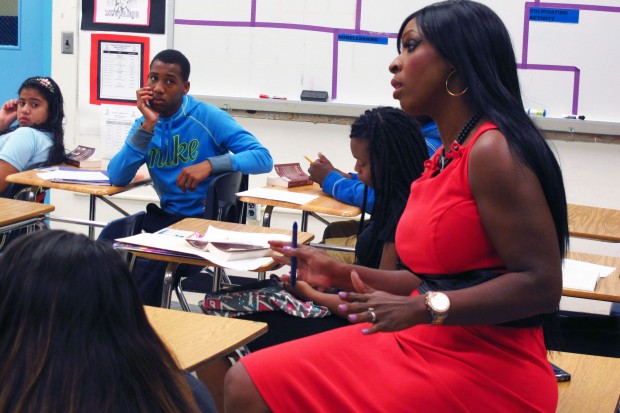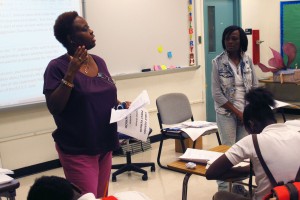Why A Miami Middle School Is Teaching Debate To Conquer Common Core
Bridget McKinney, principal at Miami’s Allapattah Middle School, says her students struggle to pass the state’s reading and writing tests.
So when McKinney first read the Common Core math and language arts standards used in Florida schools this year, what jumped out was the emphasis on answering questions and making arguments using examples and evidence from what students are reading.

John O'Connor / StateImpact Florida
Allapattah Middle School principal Bridget McKinney sits in on one of the speech and debate classes she's required her students to take. McKinney says the Common Core standards emphasis using evidence and making arguments.
It took McKinney back to college — she was a speech major. So she decided her sixth, seventh and eighth graders would have to take a speech and debate course each year.
McKinney says the goal is to improve reading and writing skills — and state test scores.
“It’s been our Achilles’ heel at Allapattah, meeting that minimum requirement for literacy,” McKinney says. “I have to be very, very innovative or an out-of-the-box thinker to make this connection for my students.”
Florida is one of dozens of states which have adopted math and language arts standards based on Common Core. The standards outline what students should know in every grade.
The state also will begin using a new, tougher test tied to the standards.
McKinney thinks the class will help prepare her students for changes in the the state’s new reading and writing exam. On the previous tests, she says, students would read a single passage and answer a few questions.
“Now they’re going to have four sources and maybe two questions,” she says, referring to snippets from magazine articles, textbooks or poems. “But in those two questions are embedded so many requirements. They have to, one, cite evidence from the four sources. They have to choose a side. They have to use proper grammar and spelling.”
LaDemia Albury is constantly asking her students for evidence.
She asks her students about their book, “Foster Care Oddysey”: Why did Mrs. Chester turn sour after her husband got sick?
She asks a student to read from her essay but cuts her off when she isn’t specific enough.
“Before Mr. Chester was in severe issues – what is the severe issues?” Albury asks. “Just be specific. You’re wasting time with that. You wasted your opportunity to win a case.
“The man is dying. He has emphysema. Why didn’t you write that?”
Math and language arts are the main focus of Common Core standards.

John O'Connor / StateImpact Florida
LaDemia Albury moved from an A-rated school to Allapattah Middle School at the request of principal Bridget McKinney.
But literacy – reading comprehension, analysis, critical thinking – are embedded throughout the standards. And that encourages schools to add more reading in non-Common Core subjects like science and social studies.
Experts say speech and debate is a natural way to support the standards.
Robert Rothman is a fellow at the Alliance for Excellent Education, which supports the Common Core.
“They’ve been included in some state standards before now but haven’t really gotten much attention,” he says.
Common Core is supposed get students ready for college or to help them get a job after high school. Rothman says employers want workers with better communications skills.
But a lot of educators argue the standards are too hard for younger students and don’t ask enough of older students. Parents complain about convoluted homework or the continued emphasis on testing.
Critics say the standards don’t address problems related to poverty, such as homelessness, hunger, or unstable families, that so many students at Allapattah Middle and other schools must deal with in addition to their studies.
And many worry special education students or kids learning English will struggle to keep up. About half of Allapattah’s students are Hispanic and many are new immigrants, particularly from Honduras.
Veldreana Oliver teaches many of those students. She says some couldn’t write in Spanish, let alone English.
But she points to a wall full of essays as evidence the debate course is working.
“When they entered here in August, they couldn’t do that,” she says. “It’s October. I couldn’t get a sentence, but now I’m getting two paragraphs.”
And just like walking comes before running, back in LaDemia Albury’s classroom, you have to learn to write before you can debate.
“When are we going to start debatin’ in here?’,” Albury says, immitating a student’s question. “And I made it clear to them that until you learn how to put your argument down clearly… on a sheet of paper, we will never start the verbal part of it because we have to get the written part down pat.”


